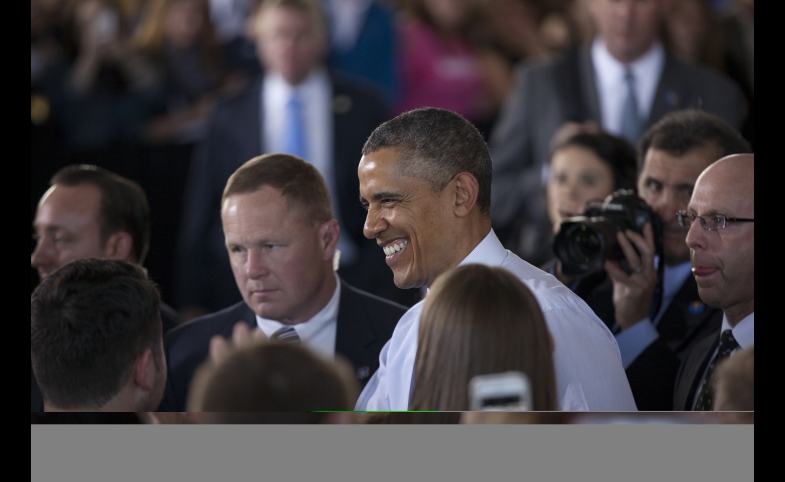The terrorist attack in Stockholm on Friday April 7, 2017 came as a shock, but by Monday the area around the Åhlens store where the attack took place was back to business as usual. Over the weekend and during the following...
KEEP READINGThe CPD Blog is intended to stimulate dialog among scholars and practitioners from around the world in the public diplomacy sphere. The opinions represented here are the authors' own and do not necessarily reflect CPD's views. For blogger guidelines, click here.

Obama Sets Foreign Affairs Stage for Next President
President Barack Obama is spending his political capital, one country at a time.
Going around the world to bridge relations with former adversaries, recognize and right historical wrongs, or write new chapters in an evolving world order is seldom a president’s first-term work. It is the politically difficult work done at the end of a leader’s last term, a time when he is free of re-election concerns.
Obama’s “fourth quarter” in the Oval Office reflects how other presidents used their lame-duck session to reconcile overseas actions and leverage the unique power of the presidency in foreign affairs.
In the last few weeks, the president traveled to Japan and Vietnam, executing on his rebalance to Asia, a strategy that will be inherited by future presidents. But he was able to do more.
In Hiroshima, where the atom bomb leveled a city and killed its inhabitants, Obama helped heal one more open wound of America’s past – one where there needed to be an official American recognition and reckoning, not an apology. Hiroshima is a stark reminder to this and future presidents to work toward a world free of nuclear weapons. Ronald Reagan deeply articulated this vision, Obama is the latest president to give this goal voice.
Obama’s “fourth quarter” in the Oval Office reflects how other presidents used their lame-duck session to reconcile overseas actions and leverage the unique power of the presidency in foreign affairs.
Bill Clinton used his term’s end to apologize to Greece for the Junta’s U.S. support, pursue a wholehearted Middle East peace process at Camp David (Arafat balked and undermined it), launched a series of attacks on Osama bin Laden’s Afghan training bases, and brought an enlarged NATO together for a bombing campaign to stop ethnic cleansing in Kosovo.
George H.W. Bush signed the Strategic Arms Reduction Treaty (START) with the Soviet Union’s Mikhail Gorbachev, managed the end of the Cold War, initiated the Gulf War “Desert Storm,” and went to war in Somalia before heading out the door to Kennebunkport. Bush intended to lay the difficult groundwork for a “new world order” for his successors.
Presidents leave their successors with unfinished business and messes to mop up, but they also find time and energy to clean up some of the politically difficult tasks.
Taking care of tough foreign business frees a new, first-term president from needing immediately to deal with foreign entanglements. New presidents are usually elected to focus on domestic economics, a 100-day political agenda, the fulfillment of campaign promises and the reality of running an all-too-soon re-election for a second-term. The world and its problems, however, have a way of interjecting themselves.
Given all this, it can be an outgoing president’s gift to his successor – regardless of party – to deal with intractable or politically challenging problems. Obama is actively clearing the decks for the 45th president of the United States:
- Cuba: Finally, the conditions were right and the Florida constituencies prepared for action to normalize relations with Havana. Obama ended a 50-year policy that he said “failed to advance our interests.”
- Iran: Secretive two-track diplomacy that started in the Reagan administration came out into the open and resulted in an imperfect, but desirable, freeze on Iran’s nuclear capacities. President George W. Bush began a forceful sanctions regime and Obama combined it with tireless diplomacy to open a channel for communication and narrow cooperation.
- Japan: America’s World War II atom bombs and current military presence were always the elephant in the room in U.S.-Japan relations. Obama has started a new chapter and open dialogue with this key Asian ally. The Hiroshima gesture and speech give the next president an even stronger platform to fight for nuclear nonproliferation – despite the dangerous musings of one presidential candidate to open the door to Tokyo, Seoul and Riyadh to acquire nuclear arsenals.
Regardless, the next commander in chief inherits ongoing challenges in Iraq, Afghanistan, Syria, Egypt … actually, the whole Middle East. Early geopolitical surprises, courtesy of China and Russia, are a near certainty come January 2017. But as Obama reviews his checklist, Guantánamo prison and global trade deals remain high up as the fourth quarter clock ticks down.
Photo by Kelly Kline | CC by-SA 2.0
Note from the CPD Blog Manager: This article originally appeared at The Sacramento Bee.
Visit CPD's Online Library
Explore CPD's vast online database featuring the latest books, articles, speeches and information on international organizations dedicated to public diplomacy.
POPULAR ARTICLES
-
January 29
-
January 20
-
January 28
-
January 2
-
January 8
Join the Conversation
Interested in contributing to the CPD Blog? We welcome your posts. Read our guidelines and find out how you can submit blogs and photo essays >.













